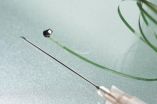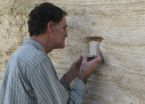Neuro signals study gives new insight into brain disorders
Research into how the brain transmits messages to other parts of the body could improve understanding of disorders such as epilepsy, dementia, multiple sclerosis and stroke
2011-03-15
(Press-News.org) Research into how the brain transmits messages to other parts of the body could improve understanding of disorders such as epilepsy, dementia, multiple sclerosis and stroke.
Scientists at the University of Edinburgh have identified a protein crucial for maintaining the health and function of the segment of nerve fibres that controls transmission of messages within the brain.
The study, published in the journal Neuron, could help direct research into neurodegenerative disorders, in which electrical impulses from the brain are disrupted. This can lead to inability to control movement, causing muscles to waste away.
Professor Peter Brophy, Director of the University of Edinburgh's Centre for Neuroregeneration, said: "Knowing more about how signals in the brain work will help us better understand neurodegenerative disorders and why, when these illnesses strike, the brain can no longer send signals to parts of the body."
The brain works like an electrical circuit, sending impulses along nerve fibres in the same way that current is sent through wires.
These fibres can measure up to a metre, but the area covered by the segment of nerve that controls transmission of messages is no bigger than the width of a human hair.
Dr Matthew Nolan, of the University's Centre for Integrative Physiology, said: "At any moment tens of thousands of electrical impulses are transmitting messages between nerve cells in our brains. Identifying proteins that are critical for the precise initiation of these impulses will help unravel the complexities of how brains work and may lead to new insights into how brains evolved."
INFORMATION:
The research is funded by the Wellcome Trust and the Medical Research Council.
END
ELSE PRESS RELEASES FROM THIS DATE:
2011-03-15
Research commissioned by Cerebra, the charity that helps to improve the lives of children with brain conditions, and carried out by the Cerebra Research Unit (CRU) at the Peninsula College of Medicine & Dentistry, has found little evidence to suggest that cranial osteopathy is of benefit to children with cerebral palsy.
The research is published on-line in the Archives of Disease in Childhood.
Osteopathy has, over recent years, become a popular complementary treatment for children with cerebral palsy. Cerebra initially asked researchers at the CRU to investigate existing ...
2011-03-15
The first major study of the wellbeing and inclusion of former politically motivated prisoners in Northern Ireland will be launched by Queen's University today (Monday 14 March).
Ageing and Social Exclusion among Former Politically Motivated Prisoners in Northern Ireland and the border region of Ireland investigated the well being and social and economic inclusion of loyalist and republican former prisoners (aged 50 and over) as older people in Northern Ireland. The report will be launched at Parliament Buildings at Stormont this afternoon.
The research was led by ...
2011-03-15
International climate negotiations are deadlocked between the affluent global North and "developing" South, between political Left and Right, and between believers and deniers. Now, authors writing in the latest issue of the International Journal of Water argue that a more integrative analysis of climate should help resolve these conflicts.
Land use changes and water management are highly relevant to climate change. To quote hydrologists Juraj Kohutiar and Michal Kravcik of the Slovak People and Water NGO: "Water evaporation is the most important agent of energy transformation ...
2011-03-15
Potsdam/Bremerhaven, March 14th, 2011. Unusually low temperatures in the Arctic ozone layer have recently initiated massive ozone depletion. The Arctic appears to be heading for a record loss of this trace gas that protects the Earth's surface against ultraviolet radiation from the sun. This result has been found by measurements carried out by an international network of over 30 ozone sounding stations spread all over the Arctic and Subarctic and coordinated by the Potsdam Research Unit of the Alfred Wegener Institute for Polar and Marine Research in the Helmholtz Association ...
2011-03-15
Calling it the "new periodic table for flies," researchers at North Carolina State University and collaborators across the globe have mapped the evolutionary history of flies, providing a framework for further comparative studies on the insects that comprise more than 10 percent of all life on Earth.
The research, published today in the online edition of Proceedings of the National Academy of Sciences, plugs gaps in the 260-million-year history of the fly order Diptera, says Dr. Brian Wiegmann, NC State professor of entomology and primary investigator of the fly tree ...
2011-03-15
Electric cars are the future – a view shared by government and the automotive industry alike. The German federal government aims to establish Germany as the lead market for electromobility. By 2020, a million passenger cars with an electric drive should be on the roads in Germany. The prospects of achieving that aim look good: As the ADAC, the German motoring organization, found out in a survey, 74 percent of those surveyed would buy an electric car if they did not have to compromise in terms of cost, comfort and safety. Consumers are not willing to compromise one iota ...
2011-03-15
Endoscopy has gone through amazing advancements in recent years. Microcameras on the tip of endoscopes supply images from the inside of the human body in ever higher resolution, which often makes it possible to identify tumors at an early stage. Endoscopes to date have some downsides, since they are expensive and, because of their multiple usages, have to be put through time-consuming and exhaustive cleaning procedures every time they are used. This problem might be solved by a new microcamera that the Fraunhofer Institute for Reliability and Microintegration (IZM) in Berlin, ...
2011-03-15
The study analyzes the actions adopted by a dozen countries after suffering disasters similar to that of the Prestige, the oil tanker which sank off the coast of Galicia towards the end of 2002, provoking a spill of fuel-oil which turned out to be one of the biggest ecological disasters in the history of Spain. "We have seen that our country has not adopted technical nor legal preventative measures, as opposed to what happened in Germany with the shipwreck of the Pallas, for example, which produced a movement of a centralizing nature, in detriment to the federal spirit ...
2011-03-15
Scientists at the National Institute of Allergy and Infectious Diseases (NIAID), part of the National Institutes of Health, have shown how the O157:H7 strain of Escherichia coli causes infection and thrives by manipulating the host immune response. The bacterium secretes a protein called NleH1 that directs the host immune enzyme IKK-beta to alter specific immune responses. This process not only helps the bacterium evade elimination by the immune system, it also works to prolong the survival of the infected host, enabling the bacterium to persist and ultimately spread to ...
2011-03-15
Earthquakes are one of the world's biggest enigmas — impossible to predict and able to wreak untold damage within seconds. Now, a new tool from Tel Aviv University may be able to learn from earthquakes of the ancient past to better predict earthquakes of the future.
Prof. Shmuel Marco of Tel Aviv University's Department of Geophysics and Planetary Sciences in the Raymond and Beverly Sackler Faculty of Exact Sciences and his colleagues have invented a new tool which he describes as a "fossil seismograph," to help geophysicists and other researchers understand patterns ...
LAST 30 PRESS RELEASES:
[Press-News.org] Neuro signals study gives new insight into brain disorders
Research into how the brain transmits messages to other parts of the body could improve understanding of disorders such as epilepsy, dementia, multiple sclerosis and stroke



